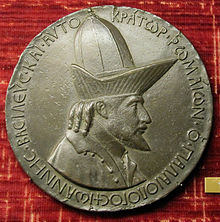

A bronze medal in sports and other similar areas involving competition is a medal made of bronze awarded to the third-place finisher of contests or competitions such as the Olympic Games, Commonwealth Games, etc. The outright winner receives a gold medal and the second place a silver medal. More generally, bronze is traditionally the most common metal used for all types of high-quality medals, including artistic ones. The practice of awarding bronze third place medals in the Olympic Games began at the 1904 Olympic Games in St. Louis, Missouri, before which only first and second places were awarded.